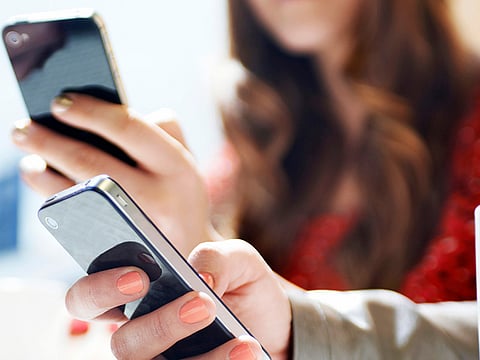Half of UAE users fail to password-protect mobile devices
Tips to stay safe on social media highlighted in wake of Social Media Day

Dubai: With nearly half (47 per cent) of the people in the UAE still failing to protect their mobile devices, and only 25 per cent using anti-theft solutions, pickpockets who get their hands on a smartphone could be in for more of a treat than even they hope for.
This is one of the latest concerns raised by cyber security firm Kaspersky Lab, which claims to have found in a survey that people are leaving their devices — and the increasing amount of precious data on them — accessible to anyone.
Many people today rely on their mobile devices to access the internet and carry out online activities. So losing a device to petty crime is potentially more damaging and upsetting than ever before, the company said in a press release.
For example, it said, 75 per cent of individuals surveyed in the UAE say they regularly use the internet on a smartphone and 36 per cent now regularly use a tablet to get online.
As such, several types of precious data are being stored on, and sent from, these gadgets.
For example, over a third (41 per cent) of people use their smartphone for online banking, which of course provides access to valuable financial information.
Furthermore, 65 per cent of people regularly use their smartphone for accessing their personal email accounts and 66 per cent say they use it for social media activities, both of which involve a huge quantity of sensitive data.
But having a lot of precious data on their mobile devices doesn’t necessarily make people conscious and secure, the company said.
Only (53 per cent) of people password-protect their mobile devices and just 14 per cent of people encrypt their files and folders to avoid unauthorised access.
So, if these devices fall into the wrong hands, all of this data — from personal accounts, to photos, messages and even financial details — could become accessible to someone else, it warned.
Even losing devices that are protected with passwords can still have significant consequences.
For example, less than half (46 per cent) of people make backups of their data and only 47 per cent use anti-theft features on their mobile devices, meaning that these devices’ ex-owners will likely experience a lack of access to their own personal information and accounts as a result.
Dmitry Aleshin, VP for Product Marketing, Kaspersky Lab said: “We all love our connected devices because they give us access to vital information, from anywhere at any time. They are valuable items that criminals naturally want to get their hands on, and their job is made easier by the fact that every other pickpocketed phone is not password protected.”
“There are a few really simple things that everyone can do to secure their devices and the data they hold. By applying password protection and using a dedicated security solution, including anti-theft protection, you can protect your personal information, photos and online accounts from both loss and malicious usage.”
Tips to stay private and secure on social media
Marking the ninth official celebration of the Social Media Day on June 30, Daniel Markuson, digital privacy expert at NordVPN, has provided the following tips to stay private and secure on social media
Use strong, unique passwords
■ Avoid using the most popular password — ‘password.’ Change your passwords regularly, preferably every 3 months, and use a combination of capital letters, numerals, letters, and punctuation.
Use two-factor authentication
■ Enabling two-factor authentication or at least login verification adds an extra security layer by requiring one more authentication step after entering your password. It helps when logging in from an unknown device.
Beware of phishing scams
■ You receive a message saying that your account has been hacked, and you need to click the link to restore your account. You click on it, enter your login details, and voila, you’ve been hacked! That was a fake email and a fake site, and you wouldn’t know until your information gets stolen. The key rule — don’t click on any links shared by people you don’t know.
Revoke access to third-party apps
■ During your social media life, you have probably used some third-party apps for photo editing, gaming, etc. Check whether you are still using all of the apps that you have permitted access to view your account. Revoking access to applications that are no longer in use, as well as any suspicious apps is recommended.
Take care of your social media accounts
■ Check your Facebook, Twitter and Instagram privacy settings, as well as all other social media platforms you use. In most cases, there are a few ways to manage who can see your status updates, photos, check-ins or if your profile is visible to search engines outside of those platforms. Finally, it is always a good idea to share without oversharing. Consider an option not to use geotags — not necessarily all of your followers need to know the location of your house.
Use a VPN
■ If you log in to your social media accounts on a public WiFi hotspot, keep in mind that you are putting your account security at risk. If you must do that, use a VPN service which will encrypt your internet data and protect your identity and personal information from hackers or identity thieves.



